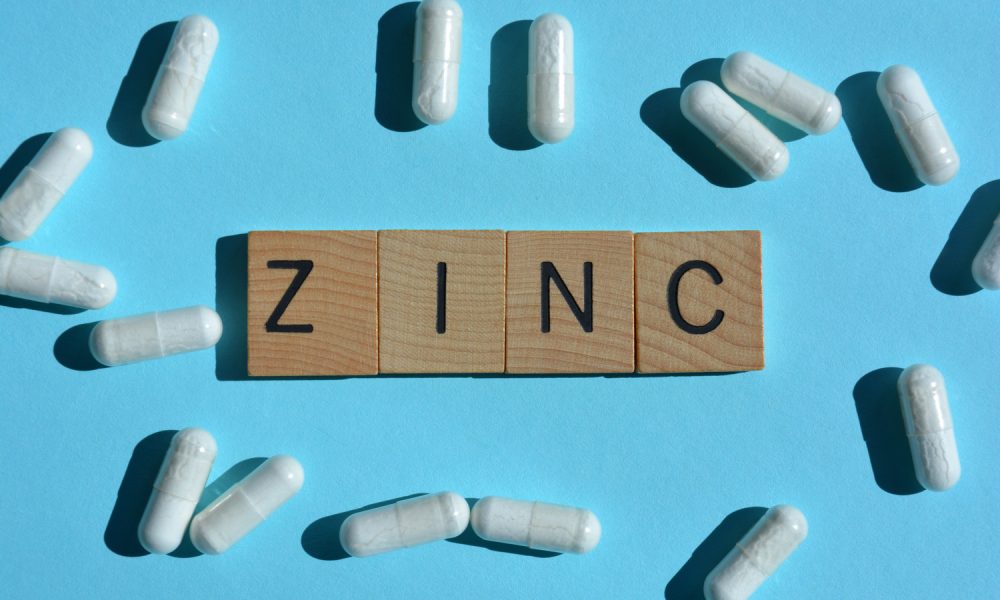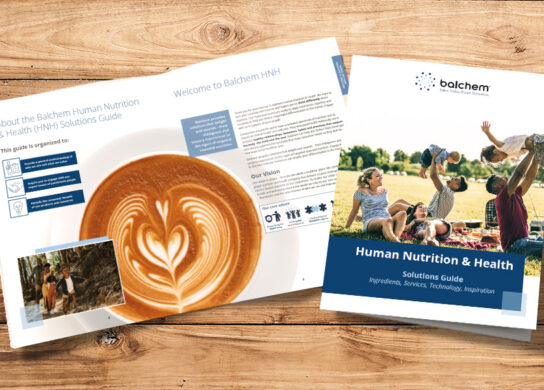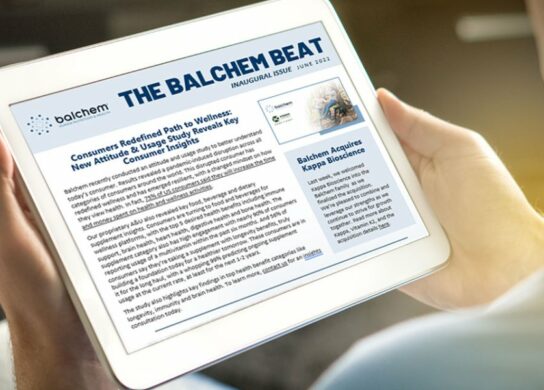
Sports, Exercise, and Zinc
Research concerning the relationship between sports, exercise, and mineral nutrition has been in progress for a few decades. A widely held idea is that strenuous exercise can increase the need for minerals, which has led to a perception that mineral supplements may be beneficial for people who engage in physically demanding sports. The rationale is that strenuous exercise can increase the demand for certain minerals, and exercise can lead to an increased rate of minerals lost through urine and sweat. Other research has found that exercise increases the body’s need for certain minerals.
The physical danger of mineral deficiency is further compounded by other findings. It has been documented that the U.S. population in general does not consume the proper amount of essential minerals. Additionally, some athletes—female athletes in particular—have diets that are very low in some key minerals. Researchers have surmised that the inadequate intake of some minerals by people engaged in strenuous exercise could lead to the lowering of their endurance, a depressed immune system, and the beginning of some diseases. The interest in this area has resulted in literally thousands of reported clinical trials, surveys, and research on the causes of some diseases—all devoted to sports, exercise, and mineral nutrition.
Minerals
Minerals play many roles in the human body, and their impact seems to differ depending on the type of exercise one engages in, as well as the environment where the activity takes place. For example Anaerobic (short powerful movements, as in weight training and judo) or aerobic exercise (like cycling or jogging), hot weather or cold, high elevation or at sea level—all of these factors influence the role of minerals in the human body. The effort level and the duration of the exercise also have an impact. Recent research on this topic shows that magnesium, zinc, copper, and iron appear to be the prominent minerals impacted by exercise—with magnesium and zinc being the most prominent overall. The minerals potassium and sodium are also important for sports and exercise performance. (Note that this review is on minerals, not electrolytes, which also play critical roles in the sports/exercise arena.)
Zinc (Zn)
It has been established that strenuous exercise can change zinc levels in the body. The variations in plasma zinc levels can be related to the intensity of the exercise.i There are short-term effects of exercise on zinc metabolism in the body, and a constant high level of exercise will give rise to long-term effects on zinc levels. Long-term endurance training causes lowered zinc levels in both males and females. Severe zinc deficiency can affect muscle function and can cause a reduction in endurance. Several studies have shown that athletes involved in anaerobic exercise exhibit higher zinc levels than those who are involved in aerobic exercises.
Zinc Metabolism in the Athlete: Influence of Training, Nutrition, and Other Factors
Zinc levels were measured four times (October, January, March, and May) in six young male athletes during a nine-month sporting season. A significant decrease in zinc was observed after five months of intense training. This cannot be explained by changes in their dietary habits, hormonal changes, or by the existence of minor infections such as the flu. Additionally, their dietary intake of zinc seemed adequate. The results support the hypothesis that zinc status may be slightly altered in high-level athletes.ii
Effect of Training on Zinc Metabolism: Changes in Blood Serum and Sweat Zinc Concentrations in Athletes
The purpose of this research was to determine the effects of daily physical training on zinc levels in blood serum (the fluid that separates from the clotted blood, similar to plasma) and zinc concentrations in sweat. The research was conducted with professional athletes between the months of October and December—their competing season.
Twelve volleyball players and another twelve control subjects participated in this study. In October and December, tests were conducted which consisted of a progressively intense bicycle test. Blood samples were obtained at rest and immediately after exercising. Total blood serum zinc levels increased significantly after intense exercise in both the professional athletes and the control subjects. In athletes, the change after exercise was significantly higher in December (the month ending their competing season) than in October. With respect to the zinc levels in their sweat, it was the same level for both the control subjects and the athletes in October. In December, however, zinc levels in the sweat were significantly higher in athletes when compared with the control subjects. In October, the zinc concentration in urine was similar for both the athletes and the control subjects. But, in December again, the athletes showed an increase in urinary zinc levels over the control subjects.
In conclusion, a daily and maintained practice of exercise is probably responsible for a change in zinc levels for these professional athletes. The results suggest that taking a zinc supplement and/or controlling stress overall may prevent low zinc levels. It was concluded that changes in zinc levels, along with stress, can lead to fatigue and decreased endurance.iii
In addition to the above studies, there have been many other studies on the effect of exercise on zinc status. The following causes of zinc deficiency have been found:
- Expansion of Plasma Volume: Plasma zinc levels have been seen to decrease at a rate of 12-33% during physical training. But only up to 12% of that loss can be attributed to an increase in plasma volume.
- Increased zinc excretion (urinary and sweat): Studies have found that urinary zinc loss increases by 10-45% after moderate exercise and is higher in athletes than most individuals.
- Redistribution of zinc:It has also been shown that exercise will cause zinc to be redistributed in the body, and therefore not readily available for digestion and use. Overall, exercise results in the loss of zinc, and exercise done on a regular basis can lead to a very low level of zinc available to the body. An important study in 2006 examined the effect of intense exercise on professional athletes and its effect on thyroid and testosterone levels. The study determined that intense exercise led to a significant drop in both thyroid and testosterone levels. Further, the researchers found that a 4-week course of oral zinc supplementation prevented this drop.iv
Research findings on zinc and its relationship to exercise and athletic performance will continue to result in new and exciting findings. The biological and chemical changes in zinc during digestion and during exercise are complex. And the effect of exercise has been seen to vary by type, duration, and intensity, as well as scheduled training by athletes over long periods of time. As you may note in Table 1, the zinc levels for the U.S. population are low; Americans receive less than two-thirds of what the RDA recommends. Knowing that exercise programs demand zinc and that a deficient level of zinc can have a negative impact on the immune system and on general health, the proper zinc supplement is important.
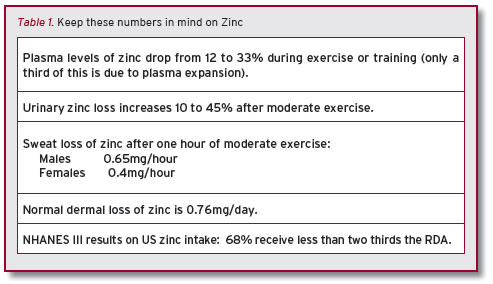
What is the Best Zinc to Take?
If one was thinking about putting together an ideal dietary formulation of zinc aimed at taking care of the needs of those in exercise training programs across the country and those in athletic competitions, it would need to be a form of zinc with excellent bioavailability (zinc that is readily absorbed by the body in its complete or unchanged form). It would also need to be free of undesirable side effects or adverse reactions. In the following recently published study, Albion’s Zinc (Bis) Glycinate Chelate was demonstrated to be a zinc form that meets and exceeds these expectations.
A Bioavailability Study Comparing Two Oral Formulations Containing Zinc (Zinc Bis-glycinate vs. Zinc gluconate) after a Single Administration to Twelve Healthy Female Volunteers
Currently, zinc intake among Americans frequently falls below what is recommended, and zinc is an essential trace mineral needed by the body. The aim of this study was to compare the oral bioavailability of zinc bis-glycinate (Albion’s formulation) to zinc gluconate (a common reference formulation seen in the nutrition industry). A randomized study was conducted with 12 female volunteers. The two different zinc forms were administrated orally at a single dose of 15mg. The comparison between the two treatments showed that the bis-glycinate form of zinc administration was safe and well tolerated by the volunteers. It was also more readily absorbed by the body than zinc gluconate.vRobert DiSilvestro at Ohio State University compared Albion’s Zinc (Bis) Glycinate Chelate to other common forms of zinc supplements: zinc picolinate, zinc gluconate, and zinc oxide. Table 2 lists the increase in plasma zinc seen with each zinc form. The data in this table shows that Albion’s Zinc (Bis) Glycine Chelate outperformed the other three forms of zinc by a wide and significant margin. The intestinal absorption rate of Albion’s Zinc Glycine Chelate:
- Performed 3.2 times better than zinc picolinate
- Performed 1.67 times better than zinc glyconate
- Performed 3.22 times better than zinc oxide
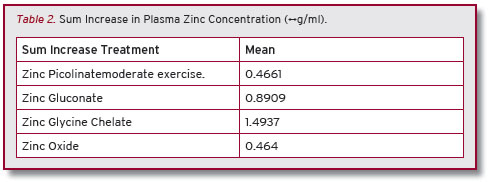
In Conclusion
Research proves that exercise requires proper mineral nutrition. And exercise has been shown to increase the need for proper mineral nutrition. Whether the increased need for zinc nutrition is caused by exercise, a diet that does not include enough zinc, or simply stress, it is evident that zinc is important in maintaining good health and physical performance.
References
- i Cordova A; Alvarez-Mon M; Neurosci Biobehav Rev. 1995; 19(3)
- ii Couzy F ; Lafargue P ; Guezennec CY Int J Sports Med. 1990; 11(4):263-6 (ISSN: 0172-4622)
- iii Cordova A ; Navas FJ Ann Nutr Metab. 1998; 42(5):274-82 (ISSN:0250-6807)
- iv Kilic M, et al., Neuro Endocrinol Lett 2006;27(1-2): 247-252
- v Gandia P, et al. Int J Vitam Nutr Res; 2007;77(4):243-8.

